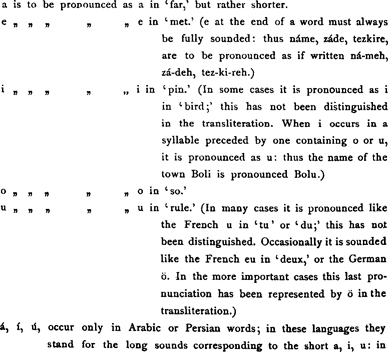
As the present work is addressed in the first place to the general reader, no attempt has been made, when transliterating Oriental names and words, to distinguish between the several homophonous letters of the Ottoman alphabet. A definite system of transliteration has, however, been observed; and attention to the following remarks will ensure an approximately correct pronunciation.
The Ottoman vowel-system is highly elaborate; but here it will be sufficient to note: —


The consonants are to be pronounced as in English, subject to the following notes: —
ch as ch in ‘church.’
g is always hard as in ‘get,’ ‘give,’ never soft as in ‘gem,’ ‘gin.’ (When g is followed by á, a slight y sound is introduced between them, just as when a Cockney says ‘gyarden’ instead of ‘garden:’ thus the name Nigár is pronounced as if written Nigyár. When g follows a vowel it has a tendency to melt away into a y; thus the title written Beg is pronounced Bey.)
gh is pronounced as gh in ‘ghastly’ or ‘ghost.’ (When gh follows a vowel it has a tendency to melt away into a sort of w, much as in our words ‘through’ and ‘throughout:’ thus oghli is pronounced like ó-lu.)
h must always be fully pronounced whether it occurs at the beginning, in the middle or at the end of a word.
k (When k is followed by á, a slight y sound is introduced between them, exactly as in the case of g and á: thus the word Katib is pronounced Kyátib.)
kh had originally the sound of ch in the Scotch ‘loch’ or the German ‘Nacht;’ but nowadays it is pronounced like a simple h: thus khan, khanim, Sheykhí, táríkh, are pronounced as though written han, hanim, Sheyhí, táríh.
ñ had formerly a nasal sound, but is now generally pronounced as a simple n.
q is pronounced exactly like k: thus qasída, Báqí, Ἅshiq, are pronounced as if written kasída, Bákí, Ἅshik.
s is always sharp as in ‘mouse,’ never flat as in ‘reason.’
sh is the English sh in ‘shall,’ ‘rash,’ and ‘so on.
῾ represents the Arabic letter Ἁyn; in Turkish, when this occurs in the middle of a word, its presence is indicated by a slight hiatus or catch in the breath; when it occurs at the beginning of a word, it is entirely ignored in pronunciation: thus RefíἉí and Ἅshiq are pronounced Refí-í and Ἅshik.
᾽ indicates that a letter is omitted; when this occurs between two vowels, it also has the value of a slight hiatus, as in the name Ἁtá᾽í pronounced Atá-í.
When a letter is doubled in writing it is also doubled in pronouncing; thus the word mukhammes is pronounced mu-ham-mes, each m receiving its value, as in our compound, ‘home-made.’
Accentuation is less strongly marked than in English; but as a general rule the last syllable of a word receives a certain stress, and this even if the word contain one of the Arabic or Persian long vowels á, í or ú: thus ghazel is pronounced as gha-zèI rather than as ghà-zel; and the last syllable of qasída takes a slight accent, qa-sí-dà, notwithstanding the presence of the í in the middle syllable.
In the case of Oriental words that have become naturalised in English, the ordinary spelling has been retained when this adequately represents the pronunciation. Of such words are Islam, Koran, Houri, Sultan, Bey, Cadi, and Dervish, which according to the system would he written Islám, Qur’an, Húrí, Sultan, Beg, Qádi (for Qází), Dervish. On the other hand Vezir (for Vezár) has been used instead of the barbarous Vizier, Khaífa instead of Caliph, Muslim instead of Moslem.
In the same way, with regard to geographical names: forms that have become established by usage, such as Aleppo, Cairo, Baghdad, Crimea, have been employed instead of their originals, Haleb, Qáhira, Baghdád, Qirim; in the case of Greek and other European names modified by the Turks, the original form has been retained when this is the more familiar, thus, Adrianople, Smyrna, Bosnia, for Edirne, Izmir, Bosna; otherwise the Turkish modification has been used, thus, Qonya, Iznik, Izmid, for Iconium, Nicæa, Nicomedia.